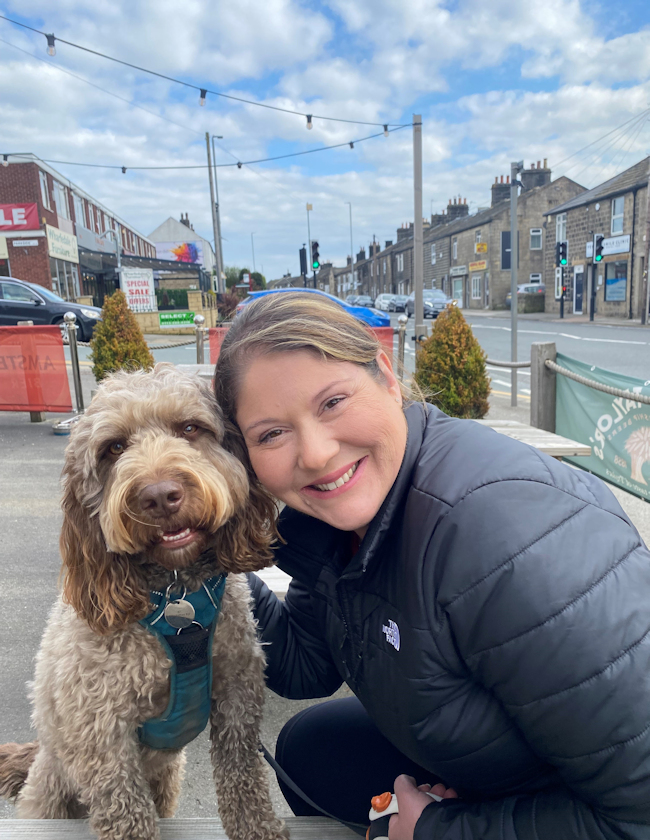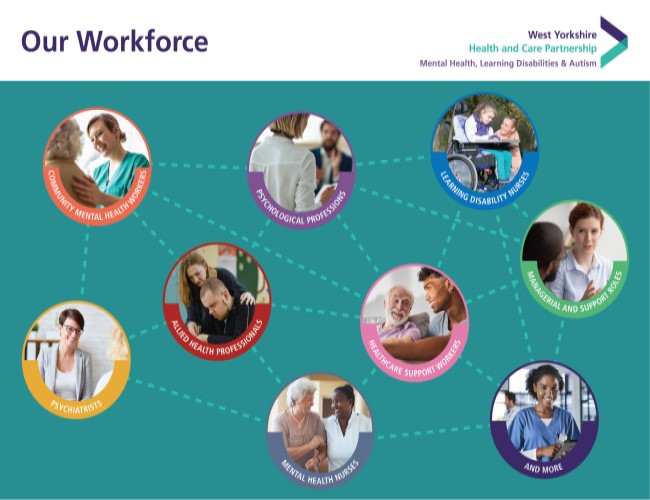Posted on: 27 March 2024
 Hello, my name is Kate. I am a Senior Research Midwife and also the Communications Lead for the NIHR Applied Research Collaboration (ARC) Yorkshire & Humber. I know what you are thinking…how has a midwife ended up in communications? Well, it’s one of those situations where all your previous roles and experiences finally come together to complement each other nicely in one job.
Hello, my name is Kate. I am a Senior Research Midwife and also the Communications Lead for the NIHR Applied Research Collaboration (ARC) Yorkshire & Humber. I know what you are thinking…how has a midwife ended up in communications? Well, it’s one of those situations where all your previous roles and experiences finally come together to complement each other nicely in one job.
I graduated from Leeds Metropolitan University in 2004 with a degree in events management and worked in various roles before moving into public relations for a property PR firm in Leeds. I loved PR and marketing, but I felt like something was missing, and I wanted to help make things better! Fast forward 10 years and after the birth of my son I decided to become a midwife. I left PR, marketing and events behind and enrolled at Bradford University to do midwifery.
I loved midwifery, but it wasn’t long until I stumbled across research delivery, learning that evidence shows clinically research active hospitals have better patient care outcomes. More importantly, a review of over 20,000 women who took part in women’s health studies found that they had 25% better odds of improved outcomes; this benefit increased to 38% in higher quality studies and to 43% in those where the intervention was not available to non-participants (Nijjar SK et al BJOG 124: 863-871, 2017). This really ignited a passion in me to be at the forefront of making things better for women and their babies and give EVERY woman an opportunity to be involved in research. I always say, if there was anything else identified that could improve outcomes for women and babies, we would be doing it, so why aren’t we offering research to every pregnant woman in our Trusts?
Whilst running the women’s research team at Leeds Teaching Hospitals, I set up the BaBi Leeds study. BaBi Leeds is part of the BaBi Network, a network of local electronic birth cohort studies supported by the Born in Bradford programme and the NIHR ARC Yorkshire & Humber (YH ARC). BaBi sites invite pregnant women to join the study and allow health researchers to join together routinely collected data about them and their baby with the aim to improve the health and wellbeing of families through research. It wasn’t long after that the BaBi Network asked me to go on secondment to Bradford, to help other Trusts across the country set up their ‘BaBi’.
I have currently supported 12 sites to set up BaBi, creating three communities of practice for collaboration and knowledge sharing, and so far, the BaBi sites have recruited almost 35000 participants! The BaBi sites are now working on data linkage, and identifying opportunities to work collaboratively with policy advisors, local authorities, and researchers to answer important local questions with the data based on local priorities, to improve the health and wellbeing of their communities.
Bradford Teaching Hospitals is also the host of the NIHR Applied Research Collaboration (ARC) Yorkshire & Humber. Knowing my previous PR and Marketing background from other work we have done together, the programme manager for YH ARC asked if I would help them with the dissemination of the YH ARC’s knowledge and evidence, raise the profile and understanding of the ARC and be its dedicated comms lead.
So here I am!
My communications lead role combines my favourite things – public relations, marketing, and health research. I feel very lucky to be able to use everything I have learnt over the years to be part of the ARC, helping to improve the lives of the 5.4 million people who live in Yorkshire and Humber.
The National Institute of Health and Care Research (NIHR) and the Department of Health and Social Care (DHSC) recently confirmed that ARC Yorkshire & Humber has received an 18-month costed extension, taking us to the end of March 2026.
This extension will enable us to carry on working in collaboration with the leading health and care research expertise from universities, NHS hospital trusts, commissioners, local authorities and other partners across our region to set research priorities, increase public participation in research, and drive the translation of evidence into real health improvements.
My role during the extension is to focus on dissemination and mobilisation of the knowledge and evidence that we have generated so far, whilst raising the profile of YH ARC and increasing understanding of what YH ARC does and can do. We will do this through regular newsletters, webinars, events, our popular lunch & learn series, networking and revamping our website and promotional materials. Please sign up to our YH ARC newsletter here.
As always, I’m looking for my next learning opportunity….. so as part of my role I will be exploring knowledge mobilisation, and how it can help our ARC researchers share their research with the people who can use it and create new knowledge to catalyse change. I believe a combined approach of communication, dissemination and knowledge mobilisation will ensure the YH ARC is able to mobilise research evidence into practice quickly and effectively to benefit Yorkshire and Humber.
If you would like to get in touch about the YH ARC or BaBi, please email me on kate.
Thank you for reading.
What else has been happening this week?
West Yorkshire Health and Care Partnership becomes the first ‘Keep it Local’ Integrated Care System in the country
Our Partnership has become the first ‘Keep it Local’ ICS in the country following agreement at the Partnership Board. In the face of pressures on health and social care, this national initiative is focused on how the NHS works with its partners to prioritise supporting, partnering with and commissioning local voluntary, community and social enterprise (VCSE) sector partners.
Find out more on our website or watch this short video featuring Kim Shutler, VCSE Member of the ICB and Senior Responsible Officer for the Power of Communities Programme; Cathy Elliott, ICB Chair and Deputy Chair of the Partnership; and Tony Armstrong, CEO of Locality.
Young people from from ethnically diverse backgrounds benefit from £1.7 million boost to tackle workplace discrimination in West Yorkshire
Youth Futures Foundation has awarded the Hamara Centre £1.7 million to support young people from Bangladeshi and Pakistani backgrounds in Leeds and Bradford in seeking employment. The funding will be used to create new employment pathways for young people, drive change with local employers, and strengthen the voices of young people at work. The funding has been awarded in light of new research from Youth Futures Foundation, which found that almost half of young people from ethnic minority backgrounds have experienced discrimination while seeking to enter the workplace. Watch this video for more information.
HSJ Partnership Awards
Huge congratulations to all our West Yorkshire colleagues who were recognised at the HSJ Partnership Awards, which were held last week. They included:
Gold
- Hempsons LLP, Leeds Teaching Hospitals NHS Trust, Calderdale and Huddersfield NHS Foundation Trust and Mid Yorkshire Teaching NHS Trust: Pan-pathology procurement - procurement of a pathology managed service contract across three trusts (Category: best legal services partnership with the NHS). Find out more on the West Yorkshire Association of Acute Trusts (WYAAT) website.
Silver
- West Yorkshire and Harrogate Cancer Alliance in partnership with Airedale NHS Foundation Trust and Changeology: HODU - using analytics for effective patient scheduling and resource planning (Category: best healthcare analytics project for the NHS). The innovative project, funded by the Cancer Alliance, was recognised for using analytics for effective patient scheduling and resource planning. The focus of the initiative was the Haematology and Oncology Day Unit at Airedale Hospital, where easy to use tools were created for the teams to use. It resulted in an increased number of patients being seen, without compromising care or staff hours. Wait times reduced by more than 50%, overtime hours reduced by 75%, whilst unit running costs decreased by £15,000 per month.
- L&R Medical UK and Mid Yorkshire Teaching Hospital NHS Trust: Transforming lower limb community wound care - eliminating chronic leg ulceration in the future (Category: most effective contribution to clinical redesign).
Well done to all our finalists including:
- TFS Healthcare and Leeds Teaching Hospitals NHS Trust: TFS Healthcare managed service across five critical care units at Leeds Teaching Hospitals NHS Trust (Category: best acute sector partnership with the NHS)
- L&R Medical UK and Mid Yorkshire Teaching Hospital NHS Trust: Transforming lower limb community wound care: eliminating chronic leg ulceration in the future (Category: best community services partnership with the NHS)
- Boston Scientific and Bradford Royal Infirmary: Utilising Rezum to help with post-pandemic BPH waiting lists (Category: best elective care recovery initiative)
- Ergea UK and Ireland, St James Oncology SPC Limited, Equans, and the Leeds Teaching Hospitals NHS Trust: elevating the Leeds Cancer Centre’s capabilities (Category: best healthcare provider partnership with the NHS)
- EMS Healthcare and Locala Health & Wellbeing: Clinic in a van - Increasing access to vital services for at-risk populations in Yorkshire and Greater Manchester (Category: most impactful project addressing health inequalities).
What works in reducing inequalities
 To address inequalities in central Bradford, the Reducing Inequalities in Communities (RIC) programme was set up in 2019 as a five-year programme to test out various interventions.
To address inequalities in central Bradford, the Reducing Inequalities in Communities (RIC) programme was set up in 2019 as a five-year programme to test out various interventions.
The programme has overseen the delivery of 21 projects, involving a range of partners and has benefitted over 16,000 people.
The learning from the RIC programme is available on the Reducing Inequalities in Communities website pages.
Industrial action
The British Medical Association (BMA) has announced that junior doctors have voted to extended the mandate for industrial action for six more months. No new strike dates have been announced for England at this time.
Supporting our staff - reciprocal mentoring for neurodivergent colleagues
 In 2023, the Partnership began a reciprocal mentoring pilot with 10 staff. This included an initial training session with materials co-produced with neurodivergent colleagues to ensure that they were accessible.
In 2023, the Partnership began a reciprocal mentoring pilot with 10 staff. This included an initial training session with materials co-produced with neurodivergent colleagues to ensure that they were accessible.


